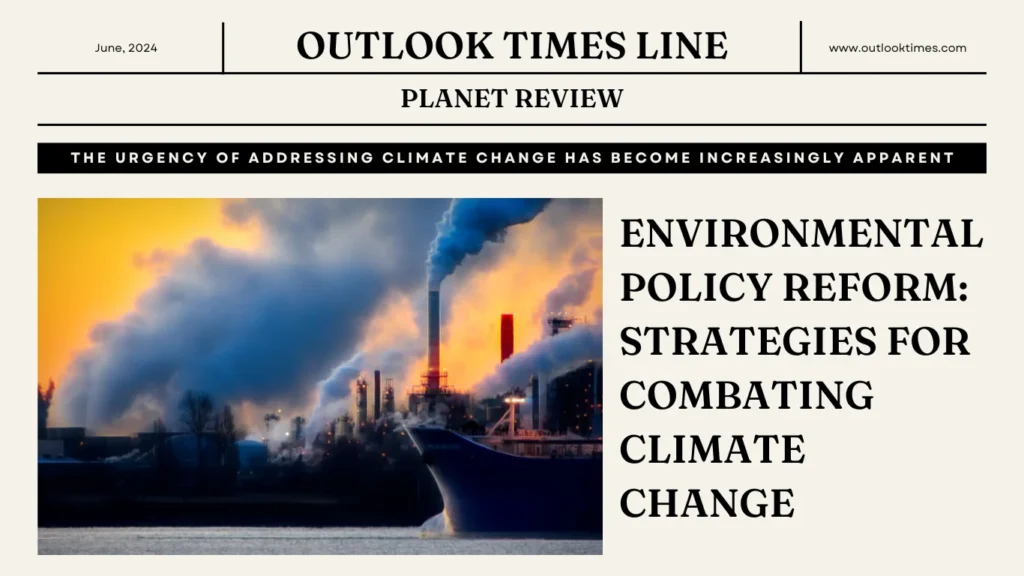
In recent years, the urgency of addressing climate change has become increasingly apparent. With rising global temperatures, extreme weather events, and melting ice caps, the need for comprehensive environmental policy reform has never been greater. Governments, businesses, and individuals alike must work together to implement effective strategies for combating climate change and preserving the planet for future generations. In this article, we’ll explore various approaches to environmental policy reform and discuss key strategies for mitigating the impacts of climate change.
Introduction to Environmental Policy Reform
Environmental policy reform refers to the process of revising existing policies and implementing new measures to address environmental challenges, with a particular focus on combating climate change. These reforms can take many forms, including legislation, regulations, incentives, and international agreements. The goal of environmental policy reform is to reduce greenhouse gas emissions, protect natural resources, and promote sustainable development while balancing economic growth and environmental conservation.
Transitioning to Renewable Energy Sources
One of the most effective strategies for combating climate change is transitioning away from fossil fuels and towards renewable energy sources such as solar, wind, and hydropower. Renewable energy technologies produce fewer greenhouse gas emissions and have a lower environmental impact than traditional fossil fuels. Governments can incentivize the adoption of renewable energy through subsidies, tax incentives, and renewable energy mandates. Additionally, investing in renewable energy infrastructure can create jobs, stimulate economic growth, and reduce dependence on foreign oil.
Implementing Carbon Pricing Mechanisms
Carbon pricing mechanisms, such as carbon taxes and cap-and-trade systems, are powerful tools for reducing greenhouse gas emissions and incentivizing businesses to transition to low-carbon alternatives. Carbon taxes impose a fee on the carbon content of fossil fuels, while cap-and-trade systems set a limit on emissions and allow businesses to buy and sell emissions permits. By putting a price on carbon emissions, these mechanisms internalize the social and environmental costs of climate change and provide a financial incentive for businesses to reduce their carbon footprint.
Protecting and Restoring Ecosystems
Healthy ecosystems play a crucial role in mitigating the impacts of climate change by sequestering carbon, regulating temperatures, and protecting against natural disasters such as floods and droughts. Environmental policy reform should prioritize the protection and restoration of ecosystems, including forests, wetlands, and coral reefs. Governments can establish protected areas, implement reforestation and afforestation programs, and promote sustainable land management practices to conserve biodiversity and enhance ecosystem resilience.
Promoting Energy Efficiency and Conservation
Improving energy efficiency and promoting conservation are essential components of any comprehensive strategy for combating climate change. Energy-efficient technologies and practices, such as energy-efficient appliances, building insulation, and public transportation, can reduce energy consumption and lower greenhouse gas emissions. Governments can support energy efficiency initiatives through tax incentives, rebates, and energy efficiency standards for buildings and appliances. By investing in energy efficiency, businesses and individuals can save money on energy bills while reducing their environmental footprint.
Strengthening International Cooperation
Climate change is a global challenge that requires coordinated action from all countries. International cooperation and collaboration are essential for addressing climate change and achieving meaningful reductions in greenhouse gas emissions. Governments can work together through international agreements such as the Paris Agreement to set emissions targets, share best practices, and provide financial assistance to developing countries for climate mitigation and adaptation efforts. By strengthening international cooperation, the global community can achieve greater progress in the fight against climate change.
The Importance of Environmental Policy Reform
Environmental policy reform is essential for combating climate change and preserving the planet for future generations. By transitioning to renewable energy sources, implementing carbon pricing mechanisms, protecting and restoring ecosystems, promoting energy efficiency and conservation, and strengthening international cooperation, we can address the root causes of climate change and mitigate its impacts on the environment and society. Governments, businesses, and individuals must work together to implement these strategies and create a more sustainable and resilient future for all.
Outlook Times
Explore the journeys of today’s most successful business leaders, uncovering the strategies, challenges, and triumphs that define their paths to success.
Trending
-
 Ignacio Bonasa
Ignacio Bonasa -
 Kathy Makino-Leipsitz
Kathy Makino-Leipsitz -
 Shaping Tomorrow: The Most Impactful Personalities of 2025
Shaping Tomorrow: The Most Impactful Personalities of 2025 -
 Dr. Harsha Thennarasu
Dr. Harsha Thennarasu -
 Vaibhav Sharma
Vaibhav Sharma -
 Ignacio Bonasa
Ignacio Bonasa -
 Beyond AI Hype: The Next Wave of Technologies Reshaping 2025
Beyond AI Hype: The Next Wave of Technologies Reshaping 2025 -
 Are Hybrid Work Cultures Sustainable? The Truth Behind the 2025 Corporate Experiment
Are Hybrid Work Cultures Sustainable? The Truth Behind the 2025 Corporate Experiment -
 “When AI Directs the Camera: Will Sora 2 Rewrite the Future of Filmmaking?
“When AI Directs the Camera: Will Sora 2 Rewrite the Future of Filmmaking? -
 Top Trailblazing Leaders to Watch in 2025
Top Trailblazing Leaders to Watch in 2025 -
 Top 5 Power Profiles: Redefining Global Leadership in 2025
Top 5 Power Profiles: Redefining Global Leadership in 2025 -
 Icons of Impact: Legendary Leaders Shaping Success in 2025
Icons of Impact: Legendary Leaders Shaping Success in 2025 -
 Ronit Pinto
Ronit Pinto -
 Beyond Limits: How Alloy Is Redefining Fitness Franchising
Beyond Limits: How Alloy Is Redefining Fitness Franchising -
 Firdaus Nagree
Firdaus Nagree -
 The Most Promising Tech Innovation of the Future
The Most Promising Tech Innovation of the Future -
 AI Excellence in Business Process Management
AI Excellence in Business Process Management -
 Iconic Voice in Soulful Leadership & Cultural Impact – 2025
Iconic Voice in Soulful Leadership & Cultural Impact – 2025 -
 Visionary Leaders: The Most Trailblazing Personalities Shaping 2025
Visionary Leaders: The Most Trailblazing Personalities Shaping 2025 -
 The Power Players: Most Dynamic and Impactful Personalities to Follow in 2025
The Power Players: Most Dynamic and Impactful Personalities to Follow in 2025
